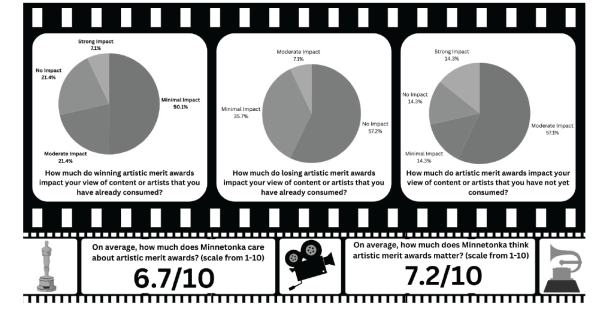Recognizing Both the Importance of and the Short-Sightedness of the Oscars
April 30, 2021
In 2020, many films were delayed for long periods of time because production companies believed that, soon enough, the films would be able to be shown in theaters again. Movies like Marvel’s Black Widow, A Quiet Place II, and In the Heights have yet to be released, and many others became indefinitely delayed. Because of this widespread delay, last year people joked that the Sonic the Hedgehog movie would win Best Picture at the Oscars in 2021. On the contrary (and much to many peoples’ surprise), many beautiful films were released in 2020. The Oscars happened this year and featured an amazing lineup of nominees, none of which are Sonic The Hedgehog.
Richard Brody, a writer for The New Yorker, noted the impact that the delay of big-budget films had on this year’s Oscars.
“It seemed obvious that the absence of many big-budget movies this past year would clear the way for smaller films to earn nominations, and that turned out to be true. Of the eight films nominated for Best Picture, only three (Judas and the Black Messiah, Mank, and The Trial of the Chicago 7) offer large-scale action. (By contrast, all of the films nominated in 2020 were elaborate productions),” he said.
Holding the Oscars in the midst of a global pandemic is historic in and of itself, but that is not the only momentous part of this year’s ceremony.
The 2021 Oscar nominee list featured more women and people of color than ever before. For the first time in Oscars history, two women were nominated for Best Director: Emerald Fennell for Promising Young Woman and Chloé Zhao for Nomadland. Zhao’s nomination is especially important as she is an Asian-American woman, making her the first woman of color to be nominated for (and win) Best Director.
Other firsts include the first Asian-American actor, Steven Yuen, and the first Muslim actor, Riz Ahmed, to be nominated for Best Actor. Steven Yuen and his co-star in the film Minari, Yuon Yuh-jung, have become the first Korean actors to be nominated for an Oscar. Minari’s nomination for Best Picture also is a first for producer Christina Oh, making her the first Asian-American woman to be nominated in that category. Also nominated for the Best Picture category is Judas and the Black Messiah, and its nomination is historic for its all-black producing trio. Finally, Viola Davis became the most nominated black actress in Oscars’ history for her nomination for Ma Rainey’s Black Bottom.
“As an Asian-American, I feel amazing and more than ever connected to my culture when I see other Asian-Americans like me being portrayed and celebrated on screen, whether it be in a huge picture film or even a small short film. Seeing Steven Yuen and Chloé Zhao nominated makes me able to see a brighter more hopeful future where there will be different chances and opportunities for more BIPOC to also be represented and recognized on-screen or in film,” MHS student Zhou Benson, ‘22, said.
She went on, “In regards to myself though, I believe that this has brought me closer and made me feel more connected and appreciative of my own culture that I honestly was mostly trying to hide to some degree when I was younger. Despite celebrating my culture through events like Chinese New Year, The Moon festival, occasionally going out to the Asian Market to purchase some nostalgic Asian treats, and even being in the Chinese immersion program since I was a little kindergartner, I feel like a little part of me always strived to Americanize myself. I never truly honored the full extent of my amazing Asian culture until recent events made me realize that I should not take any aspect of my culture for granted, as my Asian roots and the culture has, in its entirety, made me who I am today as an Asian American. Going back to the fact that artistic directors and actors like Steven Yeun and Chloé Zhao have been nominated and recognized for their work is simply amazing and truly about time. For not only us Asian Americans but all minorities.”
While these nominations are incredibly meaningful and should be highly celebrated, it is important to also recognize that these historical nominations should have happened a long time ago. Only five women have ever been nominated in the Best Director category throughout all of Oscars history, and though the South Korean film Parasite won big at the Oscars last year, none of their actors or actresses were nominated. The Oscars has done significant work to be inclusive during the past few years, but there is still so much that can be done to make up for the lack of diversity throughout its history.
To close, while these nominations and films this year should be praised, the Oscars nominees are not the only films we should consider great. There are so many other films that are works of art that have not been nominated for an Oscar, and these are sometimes the most poignant and world-altering of them all. Everyone has a film they hold dear, whether it be a film from childhood or one they just really love; most likely, it has not been nominated for an Oscar. There are so many talented creators that do not get recognized by fancy awards shows, but that does not make them any less important or valid as a piece of art. The Oscars aren’t representative of all films. Recognizing this does not take anything away from the importance of these momentous nominations, and discussing the futility of and the greatness of the Oscars can go hand in hand.





























